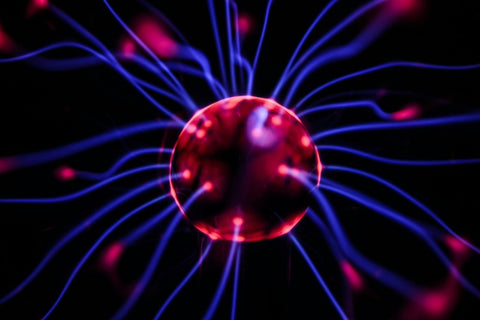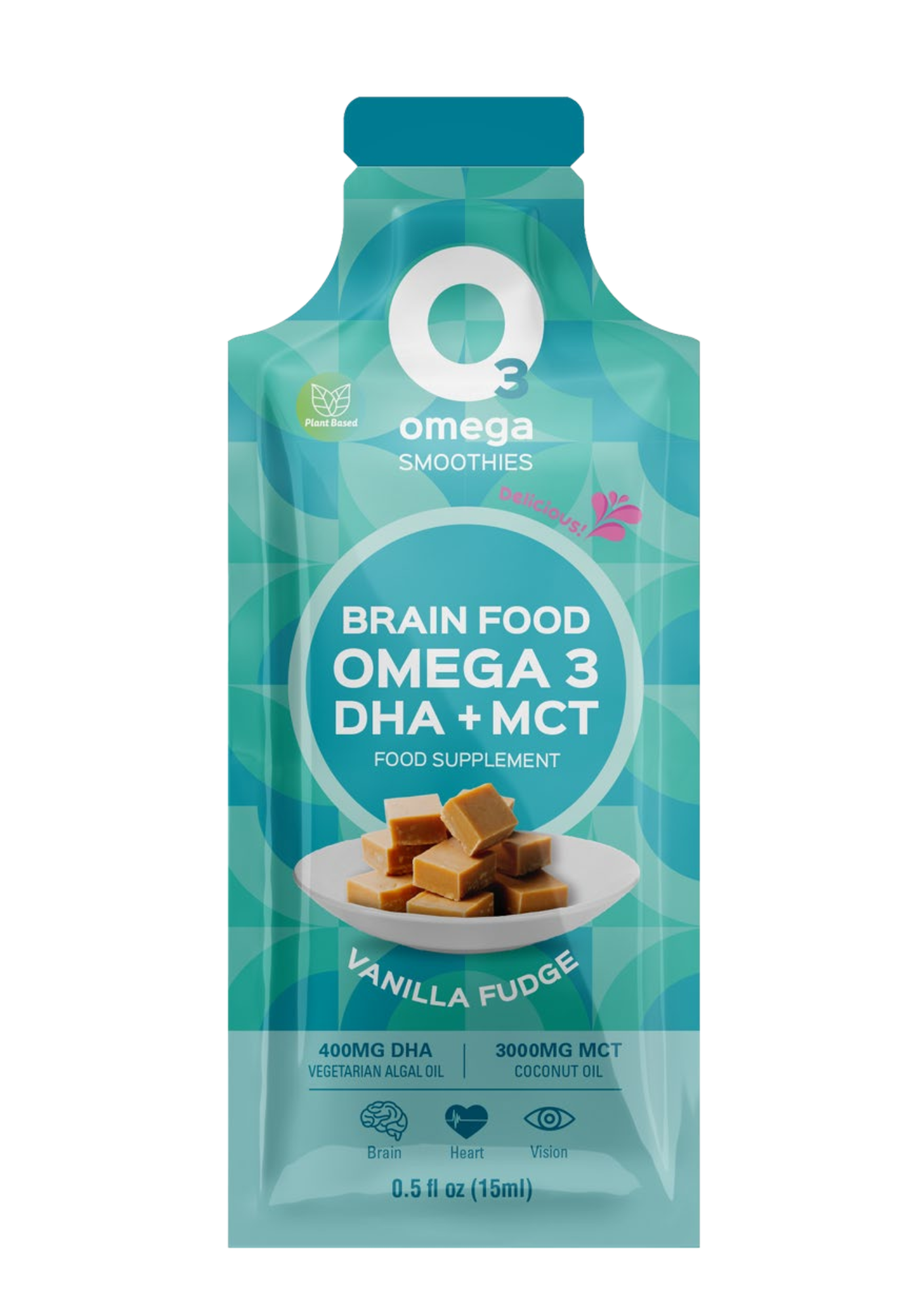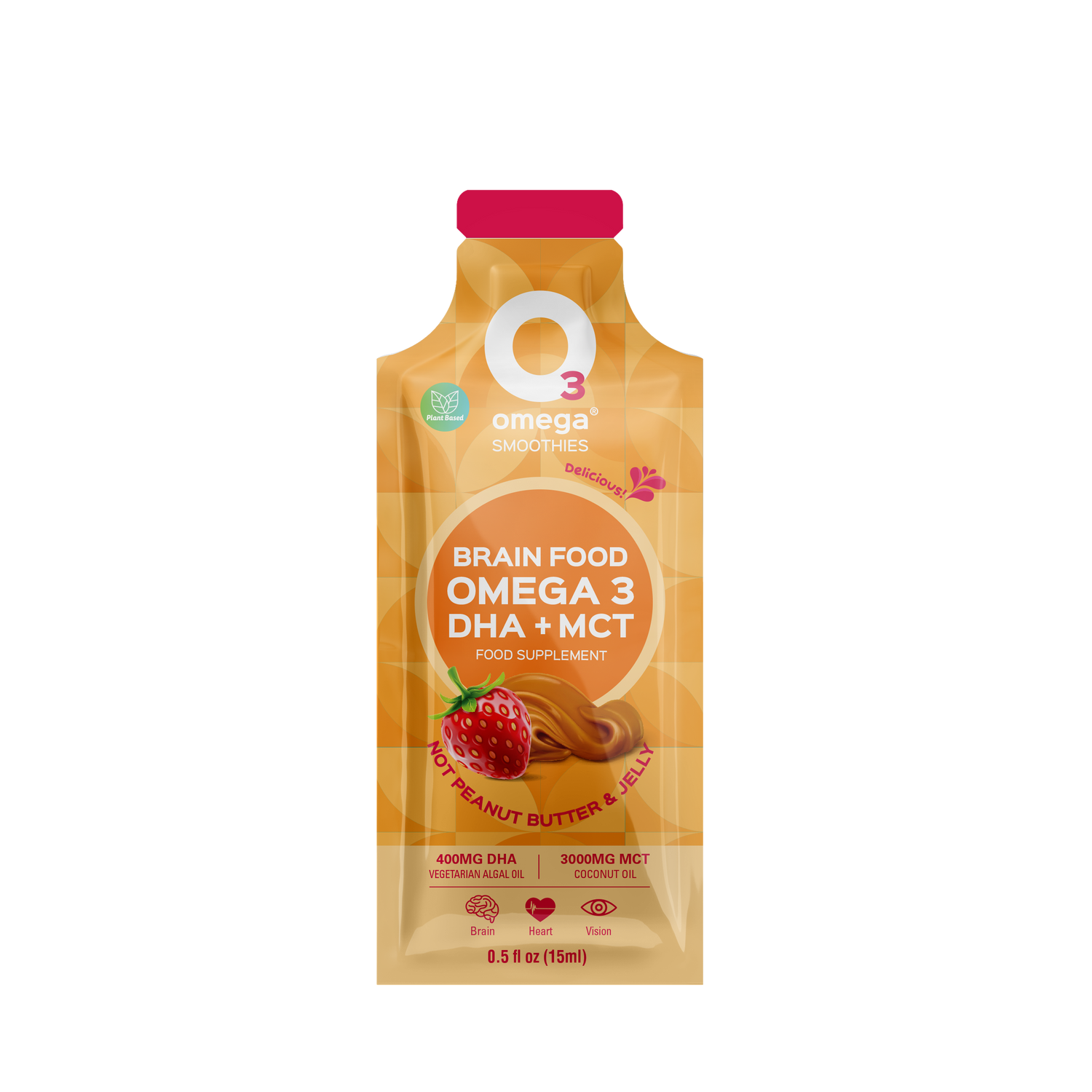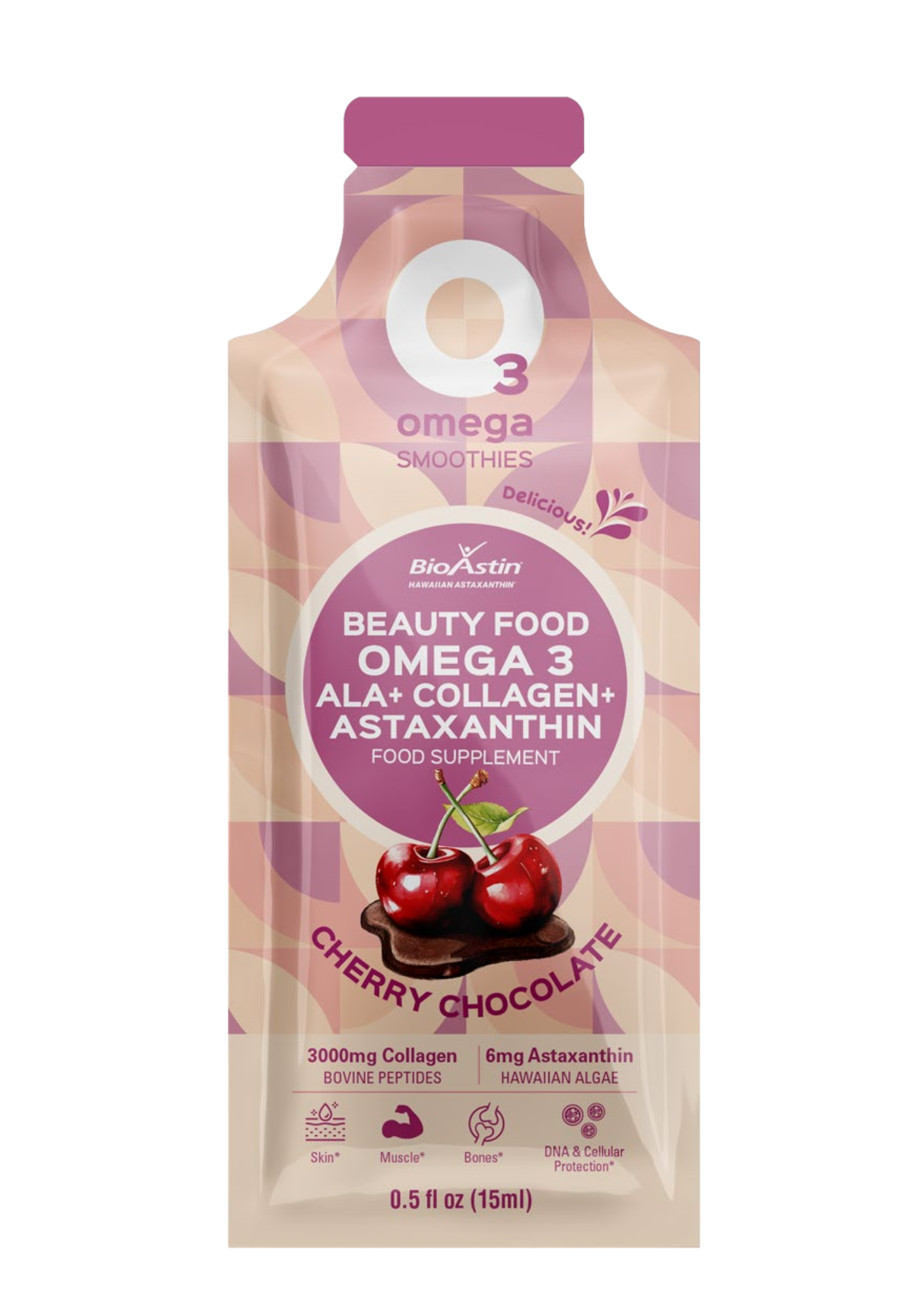Omega 3 DHA is an essential fatty acid that has a myriad of benefits for our health.
Principally, Omega 3 DHA is scientifically proven to contribute to the normal function of our brain, heart, and eyes. These Omega 3 fatty acids are essential not only as building blocks for our cell membranes, throughout our organs, and neuronal synapses (the communication pathways in our brains) but also to rebalance our Omega 3-6 ratios. Omega 3s are known to be anti-inflammatory fats that can even help to alleviate the symptoms of depression.[i]
Yet, we cannot synthesize Omega 3 DHA in the body, we must get our DHA from a nutritional source. Seafood, fish oil and certain types of algae are the most bioavailable sources of DHA. In fact, fish get their own DHA from eating algae. YES. Seaweed is the plant food richest in Omega 3 DHA on the planet.[ii]
O3Omega smoothies use algae oil from Schizochytrium, that is an algae abundant in Omega 3 DHA and is the most studied algae for its Omega 3 DHA content.[iii]
Let’s dig a little deeper and see what the scientific journals say about the Omega 3 DHA health benefits.

Omega 3 DHA benefits for your Brain
Did you know that the brain is mostly made up of fat and that more than 40% of that fat is DHA? [iv]
Many studies demonstrate that we need Omega 3 DHA for ‘visual acuity and cognitive growth’[v] and how, without sufficient DHA, brain development is compromised, particularly amongst fetal and developing brains. The adult brain needs DHA for normal cognitive functioning, neuronal health and protection from neurodegenerative diseases, and a deficit in DHA has been linked to depression, especially for postnatal mothers.[vi]
“Docosahexaenoic acid (DHA) is essential for the growth and functional development of the brain in infants. The inclusion of plentiful DHA in the diet improves learning ability, whereas deficiencies of DHA are associated with deficits in learning.”[vii]
Furthermore, insufficient DHA intake is often coupled with a host of negative outcomes, including:
“Fetal alcohol syndrome, attention deficit hyperactivity disorder (ADHD), cystic fibrosis, phenylketonuria, unipolar depression, aggressive hostility, and adrenoleukodystrophy.” [viii]
Another study solidifying the connection between DHA and brain health shows that “Omega-3 promotes cognition, neuronal preservation, and protection against neurodegeneration”[ix] This means that not only will your brain function better when you consume sufficient DHA, you could also be helping to prevent neurodegenerative diseases, such as Alzheimer’s and Dementia, protecting your aging brain.
The Shrinking Brain: DHA and the Human IQ
There are arguments that suggest the reason humans have such a high IQ, compared with other mammals, is that we evolved on the coast and consumed a seafood rich diet. Dr Michael Crawford spearheads this argument by illuminating how the average IQ in the Western World has decreased by 8 points since the 1950s. He affirms that this is because we eat more processed foods and land-based animals, instead of eating enough seafood.[x]
This really is a scary notion—that our brains are shrinking! The best thing you can do to avoid a shrinking brain is to eat more seafood and supplement with algae derived DHA, like our O3Omega Smoothies.

Omega 3 DHA benefits for your Eyes
The retinas in our eyes contain the highest concentration of DHA throughout the whole of our bodies. The structural lipid that makes up the photoreceptors in our eyes is DHA. In instances in which babies and fetuses in utero are deficient in DHA, their eye heath and eyesight are impaired. [xi]
Studies show that diets rich in DHA can delay macular degeneration, eyes diseases and vision loss.[xii] Which means that consuming more DHA in your diet can improve your eyesight, eye health and help to prevent vision loss.
Omega 3 DHA benefits for your Heart
Omega 3 DHA is known to be ‘cardioprotective’ and intake of Omega 3 DHA has been linked to a reduction in cardiovascular diseases and related deaths.
Many studies show that Omega 3 DHA can reduce blood triglycerides, high levels of which are linked to an increased risk of heart attacks and stroke.[xiii] Consuming more Omega 3 DHA shows improved blood circulation, can prevent blood clots[xiv], lower blood pressure and maintain a healthy heart rhythm, including supporting a healthy HRV (heart rate variability). [xv], [xvi]
Whether you get your DHA from seafood or algae, you need it to optimize your brain, heart and eye health.

How much is the right amount of Omega 3 DHA to experience these benefits and protection from heart disease, macular degeneration, neurodegeneration, and depression?
The general recommendation is to consume 250-500mg of Omega 3 DHA daily, which is approximately 1 O3Omega Smoothies 15ml sachet.
However, to really capitalize on the heart, eye and brain benefits of Omega 3 DHA, National Institute for Health suggest 1.1g (1100mg) DHA per day for women and 1.6g (1600mg) DHA for men.[xvii]
In O3Omega sachets, this would look like the equivalent of 3 sachets a day for women and 5 O3Omega sachets a day for men. Realistically, you will likely be getting some DHA from your diet, such as in seafood, eggs, dairy and seeds. Therefore, O3Omega Smoothies will simply bolster your DHA intake and ensure that you are consuming enough supplementary DHA to optimize your heart, eye and brain health.

In terms of seafood, here are the fish that have the highest density of Omega 3 DHA:
The recommended intake of Omega 3 DHA equates to approximately 100g of fish.[xviii] But, as you will clearly see below, it depends on the fish:
Which fish are high in DHA?
100g Trout contains 1.8g of DHA
100g Mackerel contains 1.6g DHA
100g Salmon contains 1.2g DHA
100g Herring contains 0.9g DHA
100g Anchovies contain 0.9g DHA
100g Tuna contains 1g DHA
100g Sprat (Whitebait) contains 0.8g DHA
100g Sardines contains 0.6g DHA
100g Halibut contains 0.4g DHA
100g Bass contains 0.6g DHA
100g Pollock contains 0.4g
100g Catfish contains 0.3g DHA
100g Cod contains 0.2g DHA
100g Haddock contains 0.1g DHA
100g Plaice contains 0.1g DHA
100g Sole contains 0.1g DHA
Other sources of Omega 3 DHA[xix]:
100g Egg Yolk contains 0.7g DHA
100g Human milk contains 0.2g DHA
Compare this with the flaxseeds that are incorrectly recommended for DHA, 100g of flaxseeds (which is a hefty amount of calories (550kcal) contains 42g of ALA, of which 5% may convert into DHA = 2.1g of DHA. Realistically, it would be hard to consume flaxseeds in those quantities.
Be careful of oxidized fish oils
We don’t recommend fish oil supplements as the oils go rancid and oxidize easily—causing inflammation in the body that can lead to health complications.[xx] Furthermore, fish oils can also contain PCBs, heavy metals, and other chemical toxins from pollutants in the sea. Algae is a far more sustainable, environmentally friendly and healthier way to supplement with Omega 3 DHA.
Our Recommendations
We always recommend that you get your nutrition from real foods. But to ensure that you consume enough DHA and to bolster your intake of DHA on the go, O3Omega Smoothies are a delicious and truly sustainable way to maintain—and protect—your heart, vision and brain health.
References
[i] Grosso G, Galvano F, Marventano S, Malaguarnera M, Bucolo C, Drago F, Caraci F. Omega-3 fatty acids and depression: scientific evidence and biological mechanisms. Oxid Med Cell Longev. 2014;2014:313570. doi: 10.1155/2014/313570. Epub 2014 Mar 18. PMID: 24757497; PMCID: PMC3976923.
[ii] Rocha CP, Pacheco D, Cotas J, Marques JC, Pereira L, Gonçalves AMM. Seaweeds as Valuable Sources of Essential Fatty Acids for Human Nutrition. Int J Environ Res Public Health. 2021 May 7;18(9):4968. doi: 10.3390/ijerph18094968. PMID: 34067088; PMCID: PMC8124752.
[iii] Sahin D, Tas E, Altindag UH. Enhancement of docosahexaenoic acid (DHA) production from Schizochytrium sp. S31 using different growth medium conditions. AMB Express. 2018 Jan 24;8(1):7. doi: 10.1186/s13568-018-0540-4. PMID: 29368055; PMCID: PMC5783985.
[iv] Essential role of docosahexaenoic acid towards development of a smarter brain. Gharami K, Das M, Das S. Neurochem Int. 2015;89:51–62
[v] Essential role of docosahexaenoic acid towards development of a smarter brain. Gharami K, Das M, Das S. Neurochem Int. 2015;89:51–62
[vi] Wani AL, Bhat SA, Ara A. Omega-3 fatty acids and the treatment of depression: a review of scientific evidence. Integr Med Res. 2015 Sep;4(3):132-141. doi: 10.1016/j.imr.2015.07.003. Epub 2015 Jul 15. PMID: 28664119; PMCID: PMC5481805.
[vii] Horrocks LA, Yeo YK. Health benefits of docosahexaenoic acid (DHA). Pharmacol Res. 1999 Sep;40(3):211-25. doi: 10.1006/phrs.1999.0495. PMID: 10479465.
[viii] Horrocks LA, Yeo YK. Health benefits of docosahexaenoic acid (DHA). Pharmacol Res. 1999 Sep;40(3):211-25. doi: 10.1006/phrs.1999.0495. PMID: 10479465.
[ix] Protective effects of omega-3 fatty acids against Alzheimer's disease in rat brain endothelial cells. Wang L, Fan H, He J, Wang L, Tian Z, Wang C. Brain Behav. 2018;8:0.
[x] Michael Crawford & David Marsh, ‘The Shrinking Brain and the Global Mental Health Crisis’ 2023
[xi] ‘Omega 3 DHA dominates the composition of the cell membranes in the retina, neurons and synapses.’ Michael Crawford & David Marsh, ‘The Shrinking Brain and the Global Mental Health Crisis’ 2023 p.165-167
[xii] Lafuente M, Rodríguez González-Herrero ME, Romeo Villadóniga S, Domingo JC. Antioxidant Activity and Neuroprotective Role of Docosahexaenoic Acid (DHA) Supplementation in Eye Diseases That Can Lead to Blindness: A Narrative Review. Antioxidants (Basel). 2021 Mar 5;10(3):386. doi: 10.3390/antiox10030386. PMID: 33807538; PMCID: PMC8000043.
[xiii] AbuMweis S., Jew S., Tayyem R., Agraib L. Eicosapentaenoic acid and docosahexaenoic acid containing supplements modulate risk factors for cardiovascular disease: A meta-analysis of randomised placebo-control human clinical trials. J. Hum. Nutr. Diet. 2018;31:67–84. doi: 10.1111/jhn.12493.
[xiv] Pase M.P., Grima N.A., Sarris J. Do long-chain n-3 fatty acids reduce arterial stiffness? A meta-analysis of randomised controlled trials. Br. J. Nutr. 2011;106:974–980. doi: 10.1017/S0007114511002819.
[xv] AbuMweis S., Jew S., Tayyem R., Agraib L. Eicosapentaenoic acid and docosahexaenoic acid containing supplements modulate risk factors for cardiovascular disease: A meta-analysis of randomised placebo-control human clinical trials. J. Hum. Nutr. Diet. 2018;31:67–84. doi: 10.1111/jhn.12493.
[xvi] Xin W., Wei W., Li X. Short-term effects of fish-oil supplementation on heart rate variability in humans: A meta-analysis of randomized controlled trials. Am. J. Clin. Nutr. 2013;97:926–935. doi: 10.3945/ajcn.112.049833.
[xvii] https://ods.od.nih.gov/factsheets/Omega3FattyAcids-HealthProfessional/#h2
[xviii] https://seafood.oregonstate.edu/sites/agscid7/files/snic/omega-3-content-in-fish.pdf
[xix] https://seafood.oregonstate.edu/sites/agscid7/files/snic/omega-3-content-in-fish.pdf
[xx] Cameron-Smith D, Albert BB, Cutfield WS. Fishing for answers: is oxidation of fish oil supplements a problem? J Nutr Sci. 2015 Nov 23;4:e36. doi: 10.1017/jns.2015.26. PMID: 26688722; PMCID: PMC4681158. https://www.ncbi.nlm.nih.gov/pmc/articles/PMC4681158/






0 comments